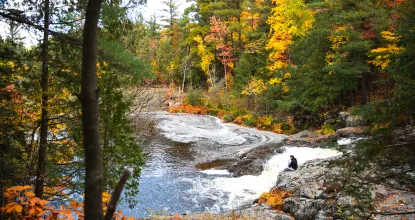
|
| Sustainable Halloween Events |
SHINE and EcoReps have hosted a couple of sustainability-focused Halloween events in the last couple of weeks! There's nothing quite as spooky as forgetting sustainability practices around Halloween! SHINE hosted a Sustainable Halloween Tabling event to initiate conversations about including sustainability practices in Halloween activities. EcoReps hosted a Costume Swap to encourage students to share costumes over the years to practice sustainable practices, such as sharing, and reusing. There are several pictures from these events posted in this article. |
| Read More |

|
| Campus Sustainability Updates - Novemeber 1, 2024 |
Vote! - November 5 Exercise your civic duty at the polls on Tuesday, November 5 to contribute your voice to the presidential election!
Marquette 2049 Learning Circle Event - November 6 The next Marquette 2049 discussion will be Wednesday, November 6th at 10 am in the Northern Center. We will be discussing what we want the Marquette community to look like in regards to Energy & Power in the year 2049. You will not want to miss out on this discussion; RSVP here! Check out the summaries from the past discussions here!
LAST Climate@Noon for Fall 2024 Semester with Dr. Alex Stoner - November 8 The NCN team cannot believe that it is already the LAST climate at noon seminar for the season! We will be discussing climate anxiety, disavowal, and the illusion of economic growth with Dr. Alex Stoner. Join us Friday, November 8th at noon in Jamrich 1311. Dr. Stoner is an associate professor of sociology and department head at Northern Michigan University. He is an environmental sociologist who studies the social divers of and societal responses to climate change. His most recent research examines the political-economic and ideological barriers to more effective and meaningful responses to the climate emergency. During this discussion he will identify the socio-structural causes of climate anxiety and explore the phenomenon of climate disavowal. Policy implications for confronting the reality of our current ecological predicament will be discussed as well.
University of Michigan Library - Free Access to Community Reading The University of Michigan Library is offering free access to a community reading through Dec. 13. Everyone in the state of Michigan is invited to read or listen to Not Too Late: Changing the Climate Story from Despair to Possibility. The book brings strong climate voices from around the world to address the political, scientific, social, and emotional dimensions of the most urgent issue human beings have ever faced. Accessible, encouraging, and engaging, it's an invitation to everyone to understand the issue more deeply, participate more boldly, and imagine the future more creatively. The audio and ebook is available at Read Michigan. If you want to learn more about this project, click here.
How to Reduce Costume Waste - SHINE See the poster attached to this article to learn how you can be more sustainable during the Halloween season. Written and designed by Isabelle Honkomp.
NMU Food Pantry The fall semester hours for the NMU Food Pantry are: 101D Jacobetti - Mondays from 1-3 pm & Thursdays 1-4 pm 101B Gries Hall - Mondays from 8 am - 1:30 pm, Tuesdays from 9 am - 4 pm, Wednesdays from 12 pm - 5 pm, and Fridays from 12 pm - 4 pm
NMU Sustainability Group Project - Take This Survey! Emma Bentley and group members are working on a project in Professor Adebiyi’s Intro to Sustainability course. Help them out with their group project by filling out this quick (3-minutes or less) survey about the Outdoor Learning Areas (OLA) on NMU's campus. The group working on this project thanks you in advance! Take the survey here!
STUDENT ORGANIZATIONS EcoReps Weekly meetings are on Mondays at 4 p.m. in Jamrich 1311. To become more involved in the organization, join GroupMe. Upcoming Events:
Green Athletics Become part of Green Athletics on The Hub. If you have questions, reach out to Makaylee Kuhn (makuhn@nmu.edu). Upcoming Events: November 1 - Zero-Waste Volleyball Game 3:30-6:30 pm November 10 - Team Apparel Swap
Conservation Crew The NMU Conservation Crew is reopening the co-leader application. They are looking for 1-2 leaders to apply. The application is open from November 1-December 14, 2024, and the co-leaders will be selected over winter break. Apply here! Upcoming Events:
INTERNSHIPS, STUDY ABROAD, AND JOB OPPORTUNITIES
|
| Read More |

|
| NMU EEGS Students Attend American Association of Geographers Conference |
Two weeks ago students who are a part of the Earth, Environmental, and Geographical
The ability to go to the conference to learn new ideas, share what the Marquette community is
Written by: Isabelle Honkomp |
| Read More |
|
|
| NMU Discount for Partridge Creek Compost |
Partridge Creek Compost is a nonprofit which aims to reduce food waste going to the landfill, improve soil health in our county, and educate our community about the environmental and social benefits of composting. From curbside compost collections to creating a high quality finished compost product, we’re here to change the course of food waste diversion for our region. Partridge Creek Compost offers 20% off their compost pick-up program for NMU students, faculty, and staff. Learn more or sign up HERE! Here are 5 reasons why you should begin composting: (sourced from PCC's 'Compost Blog' webpage)
Partridge Creek Compost is an industrial composter meaning you can throw in the meats, dairy, and food-soiled paper products that you wouldn't want to put in your home compost. Partridge Creek Compost needs 250 subscribers to be able to continue the amazing work they do! They want to make their goal by May, so let's help them now. |
| Read More |
